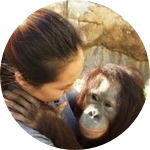About This Project
When great apes exert control over their environment their welfare improves, and when zoo visitors have opportunities to interact with great apes their desire to conserve them increases. Although digital tools can offer this, many zoos and sanctuaries are yet to integrate them into their management strategies due to lack of research. The study will look at the effects of digital free-choice on animal welfare, and conservation attitude changes via direct interactions
Ask the Scientists
Join The DiscussionWhat is the context of this research?
Great apes can successfully interact with interactive digital devices and can be enrichment by them . However, no previous research examines the impacts of free-choice digital activities, and studies in Human-Animal Interaction (HAI) are lacking.
Building upon findings from the pilot study, we will use touch-glass technology for animals to freely engage with 4 activities, thereby providing them enrichment options. Furthermore, opportunities for interaction with zoo guests will be provided through interactive digital game play.
What is the significance of this project?
Anthropomorphic views on the use of technology on captive animal care with great apes is a contentious point. Such assumptions imply that animals have better welfare when natural enrichment are offered but some studies indicate to the contrary. Enrichment strategies should be based on scientific, quantitative data rather than whether it is deemed natural or non-natural, making this study an important one.
As technologies develop, it's important to develop fundamental understanding on digital use with great apes for the improvement of animal welfare and conservation. We hope that our study will show that animals not only engage, but show improvements in time budgets and activity that show it is a viable and useful enrichment strategy.
What are the goals of the project?
The study has 2 parts. First we look at any changes in animal welfare upon providing free choice within interactive digital enrichment contexts, and analyse visitor attitudes to animals’ interaction with digital devices.
Secondly, the study will facilitate human-animal interaction, and will measure its effects on both the visitors and the orangutans/chimpanzees. By studying the effects of both animal and human engaged in the same activity, we will identify changes in both species in their welfare, as well as see how they interact with each other using the technology, and potentially building positive relationships. Visitor surveys will measure if the unique experience with the animals created any changes in conservation attitudes.
Budget
We are using relatively new touch-glass technology and your support will help us purchase digital enrichment and video recording devices.
These equipment will help us on our way to providing much needed information for captive enrichment's use of digital enrichment. It will also be used to study the effects of Human-Animal Interactions (HAIs) on great apes from animal welfare and visitor effects perspectives, as well as it’s effect on the zoo visitors to see if direct interactivity leads to greater conservation awareness and changes in attitudes.
If we do reach our goal of $1000, it won't end there!
> If we get to $3000 will help us with our video recording equipment
> If we get to $5000 will help us purchase our touch glass digital films
Our highest bidder will have a chance to play the activities themselves!
Endorsed by
Meet the Team
Affiliates
Nicky Kim-McCormack
My previous experience managing various aspects of digital media projects, as well as my passion for great ape conservation and animal welfare, has drawn me to conduct a novel multi-disciplinary research involving new technology and has provided me with the necessary skills to manage a project with digital technology focus.
Project Backers
- 22Backers
- 115%Funded
- $1,150Total Donations
- $52.27Average Donation




